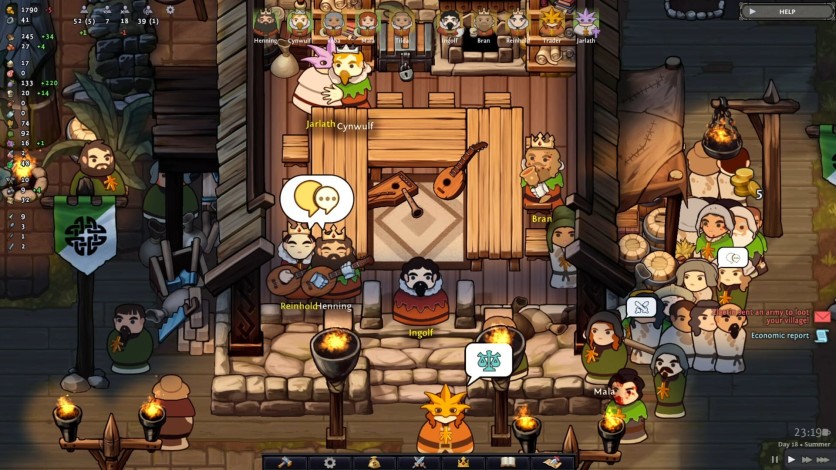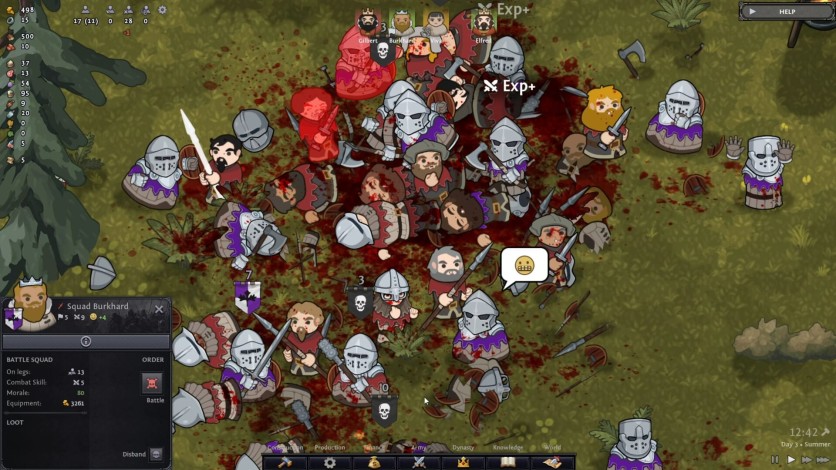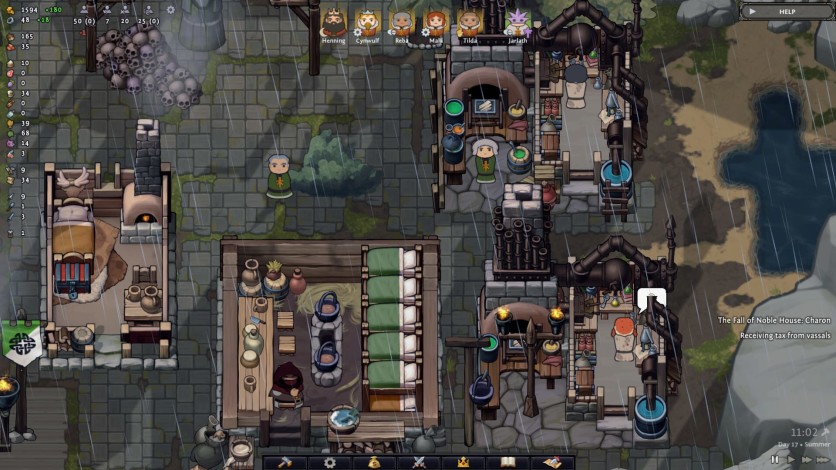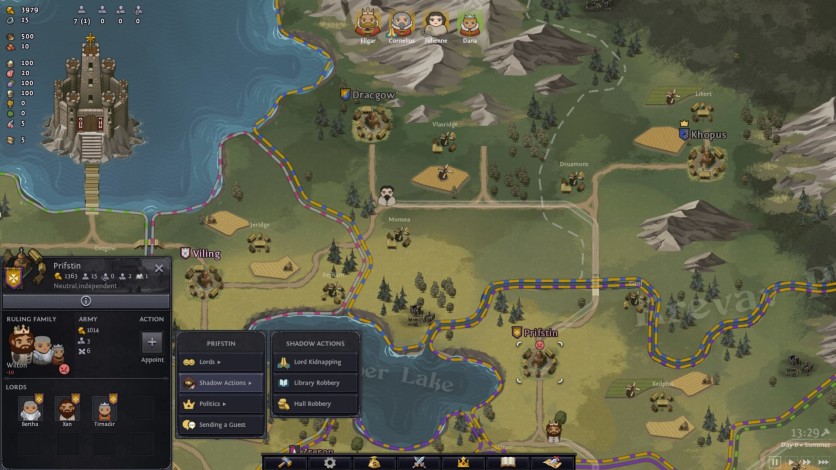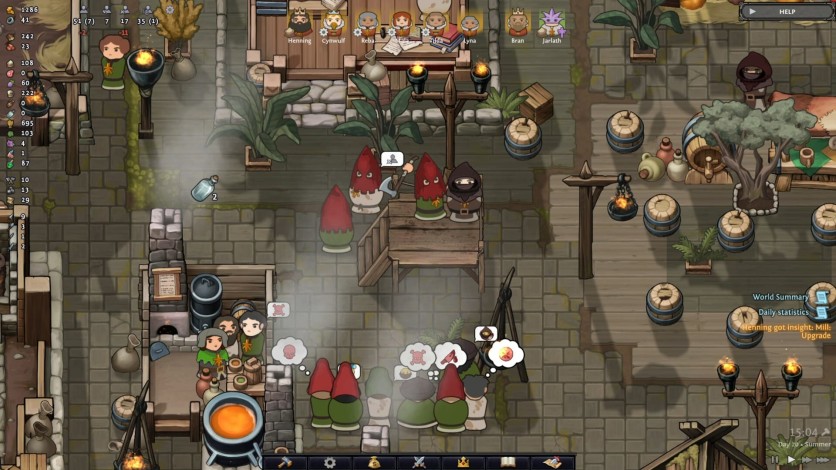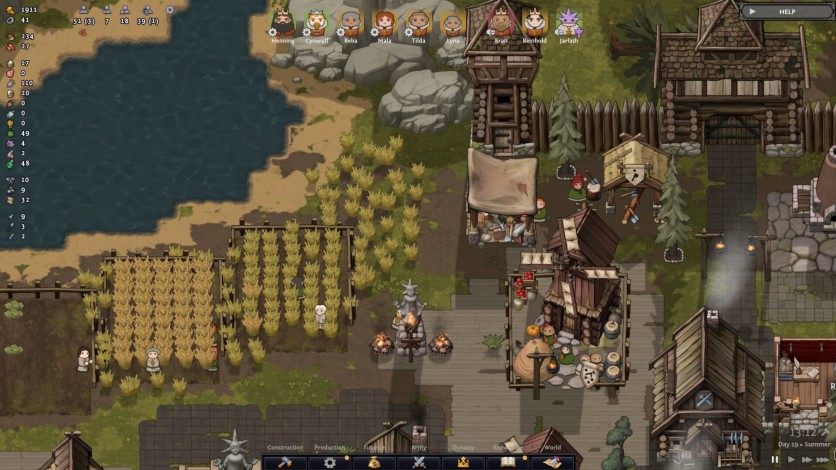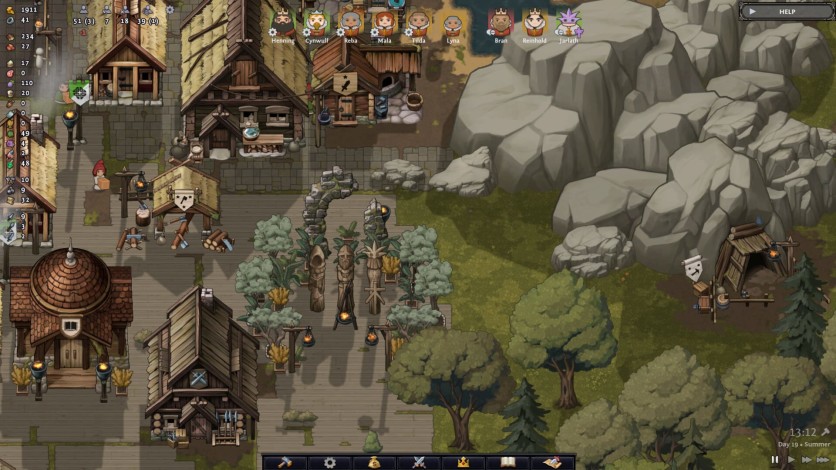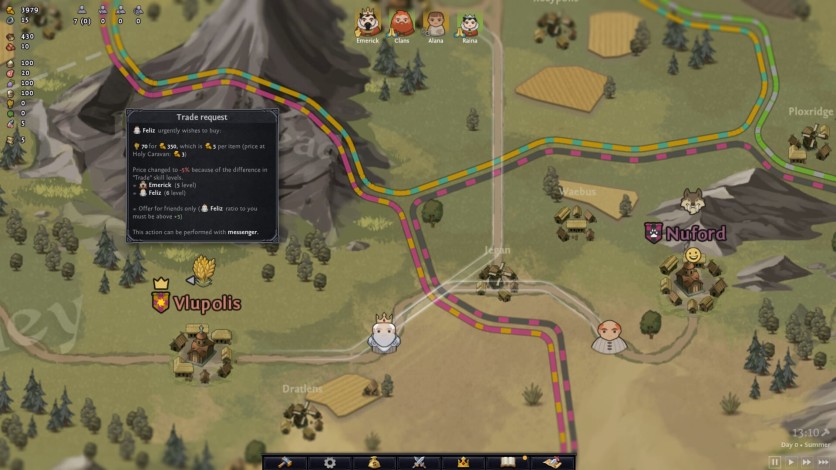

Norland
About
The Empire has fallen, leaving in its place several realms as possible successors. The lords and ladies of these petty kingdoms struggle to gain control and influence: whether through backroom deals or with sword and shield in hand, the families compete against each other and others while greater threats loom over all. Famine ravages the lives of the commoners, wars and disunity threaten the social order, noble families succumb to decadence and hedonism. As if that weren't enough, great armies are forming beyond the borders of the old Empire under the banners of invading kings who plunder and destroy everything in their path.
It is amid this uncertainty that you must lead your small kingdom to greatness and guide the members of your noble family to survival in this medieval colony simulation focused on generating tales of great courage and terrible betrayals. Es en medio de esta incertidumbre que debes llevar tu pequeño reino a la grandeza y liderar a los miembros de tu noble familia hacia la supervivencia en este simulador de colonias medievales centrado en generar historias de gran coraje y terribles traiciones.
Highlights
The Privilege of Nobility:
- Your family rules from above, working together (or against each other) to take care of your city, your kingdom, and your political plans. Each of your family members will be driven by their own strengths, weaknesses, and ambitions as they develop complex relationships with each other and with foreign rulers. Witness the blossoming friendships, indiscreet revelries, and brutal murders at the same time as your nobles give orders to the common people, lead armies into battle, and study ancient texts filled with knowledge.
- Various skills determine which of your family members are best suited for different tasks. Discover who among them are the best warriors, administrators, scribes, and negotiators. Look for opportunities to further train their strengths and educate the children to secure the future of your lineage, fostering new talents for future generations.
- In addition to their skills, each family member has attributes that determine their respective personalities and abilities, cultural contexts that influence how people see and treat them, and a wide range of desires and needs to fulfill. Lack of satisfaction breeds resentment, envy, and disloyalty, and it is amidst all of this that daggers begin to be sharpened. How will you attempt to calm the tensions, with gifts and camaraderie or by spilling blood to eliminate any threats to your favored nobles?
- At times, the blood you shed will belong to your own family. Motivated by ambition, greed, and opportunism, your family members will draw weapons against each other under certain circumstances. From rejected lovers and power-hungry siblings to children influenced by foreign kings and queens, trust is a rare commodity in these lands.
- The abilities of your kingdom are determined by what your nobles know. They will individually study ancient texts to learn new technologies, and if they should die, this knowledge will be lost unless they record what they know or pass on the information to students. Obtain books in different languages and read them to unlock new buildings, tools, and opportunities for your kingdom. Ensure that more of your family members are capable of learning the secrets contained within them, translating the texts into a language they speak as needed and thus prevent the sudden loss of knowledge due to a stray arrow. Also consider what you will do with such knowledge; will you store it in a library? Or transcribe it to use as currency in search of wealth and resources? After all, knowledge is power...
The Power of the Commoners:
- The villagers of Norland are the foundation of any kingdom, serving their noble lords in battlefields and cities with respect and loyalty... Until their bellies are empty or the beer barrels run dry. With their different backgrounds, needs, and thoughts, it is difficult to please the commoners and they are easily manipulated into rebellion, committing crimes, and believing in controversies. It is up to you to decide whether to deal with their complaints benevolently or with the executioner's axe.
- Acting through your nobles, instruct your commoners on where to work, what to prioritize, and when to fight. Although you do not have direct control over the lower class of your society, they still have hopes, dreams, and their own relationships. Managing them attentively is crucial for your success, as they are the ones who maintain the complex production chains of your city and are responsible for building structures, harvesting resources, and producing the goods that satisfy them.
- Commoners depend on the money they can accumulate to lead a satisfactory life. Control the payments made at the end of each day as well as the cost of essential elements such as food and beer in the local market to ensure that people remain motivated. Having high payments and low costs is an excellent way to encourage migration, but beware of who you welcome to your lands.
- The commoners come from different cultures that are often in conflict with each other, which can turn their coexistence in your little town into a challenge. You can use this tension to your advantage at certain times, but if the population has any problems with the succession of your family, you may end up discovering that the secret to a long life is hiring more guards.
- Some commoners are devout followers of the Church of St. Sophia and care more about the piety of the nobles, while loyalist commoners will be happy simply to have enough money to buy food and drink. Other factions and subfactions will have different priorities: as you expand your dominions and grow stronger, know that these groups will form alternative alliances when they find common goals. Even when they are formally on your side, their actions and methods may not favor you, and it will be impossible to escape the consequences of these separate agendas.
- When tensions boil over, do not hesitate to create a night patrol or take some of the most rebellious ones to test the sharpness of the axes. Sending a clear message will usually make the commoners fall back in line, but do not think you are invincible, for even a great lord is just an angry crowd away from becoming a head on a stake.
A Living World:
- Norland is set in a rich world with a vibrant past. The inhabitants form an entire tapestry of different cultural contexts with complex relationships, and the power vacuum left after the collapse of the empire has led everyone to uncertain times. In a distance, a Profane Horde grows and becomes stronger, looting and burning everything in its path, while in other places the Church of St. Sophia uses faith to maintain a vast array of resources under strict control.
- The Empire ruled a vast expanse of land and, upon its collapse, left behind many successor kingdoms vying for control. The availability of resources varies from kingdom to kingdom, and each potential starting region will give the player different advantages and challenges to overcome.
- Send your nobles with the right skills to seek alliances through marriages, negotiate advantageous trade deals, plot assassinations and kidnappings, and incite rebellions. Will you try to recruit spies and conspirators in foreign realms to undermine them from within, or do you prefer to settle your differences through the force of arms openly on the battlefield? And what will be your reaction when, inevitably, your enemies infiltrate your ranks or reach your borders with an army?
- Watch history unfold as events and calamities put you in difficult situations over time, further complicating the intricate tale of betrayal and bravery that the countless nobles and commoners of Norland continue to weave. From kidnapped family members to refugees tainted by the plague, from blackmail to natural disasters, your family will be tested over the years.
- Do not expect the rest of the world to sit idly by. Traveling nobles will seek refuge or sow conflicts, and just as you can send your family members and envoys to seek opportunities, the other realms of Norland can also do so. Bandits will establish camps in remote regions of civilization as other realms try to secure alliances and engage in wars on their own. Will you join them in their violent undertakings or will you act alone?
The Time to Wage War:
- Dissension and rebellion will cause your commoners to arm themselves against you, and even if a poorly armed uprising can be quelled by a well-trained and loyal militia, some groups plotting against you will not be so unprepared, and a succession crisis or a power-hungry relative can become your greatest threat. Keep public order under control and be wary of enemies within your midst.
- Your warriors are the same people who tend to your fields, produce your beer, and cheer at your executions. War should not be taken lightly, as precious lives will be at risk with each battle. Consider carefully whether to avoid bloodshed or if sacrificing the lives of your people is worthwhile.
- The equipment in the hands of your warriors must be imported or produced locally, limiting the composition of your armies based on your economy. Plan well before declaring war and before a war is declared against you.
- Defend your home against foreign invaders or march across the map to enter furious battles commanding the forces you have gathered and armed. Morale, combat skills, and tactical prowess may determine who will win, but no one is truly safe in the midst of swordplay.
- Through the various scenarios you can choose and a multitude of options to define your nobles and the world around you, Norland allows you to build a society and tell a unique story of any kind: belligerent lords with legions of prisoners fighting for their freedom, erudite religious fanatics trying to spread their faith, rich multicultural idealists accumulating tomes of knowledge, treacherous spies plotting assassinations and intrigues... What kind of story will you tell?
System Requirements
Minimum
- OS: Windows® 10 (64-bit)
- Storage: 1 GB
- Processor: Intel® Core™ i5-4570T (dual-core) / AMD® FX-Series™ FX-9590 (quad-core)
- Memory: 4 GB
- Graphics: NVIDIA® GeForce® GTX 550 Ti (1 GB) / AMD® Radeon™ R9 270X (2 GB)
- DirectX: 10
Recommended
- OS: Windows® 10 (64-bit)
- Storage: 1 GB
- Processor: Intel® Core™ i5-4670 (quad-core) / AMD® Ryzen™ 3 2200G (quad-core)
- Memory: 8 GB
- Graphics: NVIDIA® GeForce® GTX 550 Ti (1 GB) / AMD® Radeon™ R9 270X (2 GB)
- DirectX: 12

